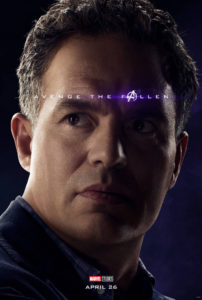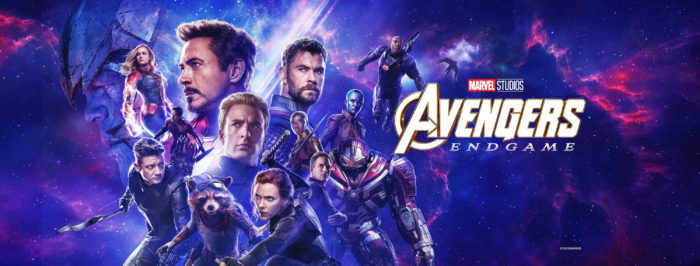 Last year’s Avengers: Infinity War was quite a unique film. Part cliffhanger, part villain-as-protagonist character piece; the movie had all the makings of standard superhero epic, and assembled the most powerful characters that really matter to most of the moviegoing public, but put all of that aside in favor of a narrative where the good guys lose.
Last year’s Avengers: Infinity War was quite a unique film. Part cliffhanger, part villain-as-protagonist character piece; the movie had all the makings of standard superhero epic, and assembled the most powerful characters that really matter to most of the moviegoing public, but put all of that aside in favor of a narrative where the good guys lose.
For most of the Avengers we’ve known and loved since 2009, we’ve never seen them fail before. Not really, not finally. At the ends of their respective films, they’ve always come back, even from near-hopeless odds, and taken down the villain with some final, decisive master stroke. A really strong punch, perhaps. Or a clever idea. Maybe a well-hidden buddy. But not in Infinity War; no, when Thanos executes his plan, they lose. Not just a little bit; they lose everything. They fail utterly. The Endgame curtain rises on a world of very little hope.
Fair warning: This article contains many, many major plot spoilers for Avengers: Endgame and most of the Marvel movies which precede it. You have been warned.
This is way more relatable for those of us who aren’t necessarily guaranteed gift-wrapped success after two hours of effort. With Infinity War, for the first time, we get to relate to the heroes of the Marvel Universe through the suffering and pain of the abject; “We wanted mature storytelling,” screenwriter Stephen McFeely told BuzzFeed. “Own the stakes. Own the consequences.” His writing partner, Christopher Markus, put it even more succinctly: “Just address everything honestly.”
These honest takes on failure, of course, don’t end with Infinity War; and if you were at the theater last weekend, odds are you saw the continuation of that story. As Markus says, Infinity War and Endgame are “a question and an answer.”
The question is “how do heroes deal with failure?” And the answer is complicated. But it’s also instructive about how to deal with failure in our own lives.
Thor and Failure
 The god of thunder probably failed the hardest in Infinity War. Half of his people were murdered by Thanos as refugees, including Thor’s on-again-off-again brother Loki and his good friend Heimdall; the Dwarves of Nidavellir were almost completely wiped out on his watch; and he failed to deliver the killing blow to Thanos.
The god of thunder probably failed the hardest in Infinity War. Half of his people were murdered by Thanos as refugees, including Thor’s on-again-off-again brother Loki and his good friend Heimdall; the Dwarves of Nidavellir were almost completely wiped out on his watch; and he failed to deliver the killing blow to Thanos.
After enduring the loss of your brother, your friend, half of your people, most of a civilization who depended on your protection, and then half the population of the universe, all either directly or indirectly because of your actions or inactions; as well as the direct mockery of the very villain who perpetrated those atrocities, I bet you’d feel pretty low, too.
As a Norse god, Thor probably hasn’t faced failure very much in his long life. So he doesn’t have very good coping mechanisms. Instead, Thor deals with failure by not dealing with it; by trying to pretend it never happened, by drowning his failure in beer and junk food, distracting it with video games, and by ignoring his responsibilities for fear that he may fail again. His failure plunges him into depression, and his depression leads him to denial.
This isn’t working well. It’s initially played for laughs, but the reality of his post-snap existence is dark. He threatens a random gamer online for some imagined slight against Korg. He tells Banner/Hulk that he’s fine, that everything is okay, just before nearly going either catatonic or nuclear at the mere mention of Thanos’ name. And then, of course, there’s his…physique. He’s not in shape, though I suppose he’s in a shape. His mood is erratic, his body is broken. The lie is taking its toll.
If you don’t recognize this temptation, you’re a better person than I. For a lot of us, our natural inclination when faced with failure is just to hide from it. But it doesn’t treat us well (physically or emotionally); it has a tendency to eat us up from the inside out, to turn us into something we don’t like or even recognize. Hiding from failure is a death sentence, and it certainly doesn’t solve the core problem: our failure is never addressed or reversed.
Natasha Romanoff and Failure
 The Black Widow deals with her failure in Endgame by just trying again. And again, and again. She leads the Avengers into space to kill Thanos, but that doesn’t bring a single person back. She becomes a shut-in who keeps bashing her head into the same wall, leading a team spread across the planet and the galaxy. It’s all she knows, so she keeps the Avengers going. And going. And going. All she has is what she’s been trained for; and in the face of her failure, the loss of her family, this is all she can do. So she just keeps on keeping on.
The Black Widow deals with her failure in Endgame by just trying again. And again, and again. She leads the Avengers into space to kill Thanos, but that doesn’t bring a single person back. She becomes a shut-in who keeps bashing her head into the same wall, leading a team spread across the planet and the galaxy. It’s all she knows, so she keeps the Avengers going. And going. And going. All she has is what she’s been trained for; and in the face of her failure, the loss of her family, this is all she can do. So she just keeps on keeping on.
This is such a natural response to failure: trying again, working harder. Maybe this time it’ll be different. Maybe you can fix it if you give it another try. But if you’ve ever failed and tried to make it better by doing the same old things, doing more, trying harder, trying to work your way out of the loss, you know that it just wears you down to nothing. You can’t grow from it. Even if you go back to the scene of your failure, even if you try to turn it back around, even if you kill the person who took everything from you, all you get is more disappointment.
Clint Barton and Failure
 I have to be honest, Hawkeye’s story in Endgame threw me completely off balance. As a husband and father, the idea of seeing my wife and children disappear in an instant, and seeing that evil people survived, would make me want to go on a vigilante murder spree too. While he never faced Thanos in Infinity War, he still (from his point of view) failed to protect his family.
I have to be honest, Hawkeye’s story in Endgame threw me completely off balance. As a husband and father, the idea of seeing my wife and children disappear in an instant, and seeing that evil people survived, would make me want to go on a vigilante murder spree too. While he never faced Thanos in Infinity War, he still (from his point of view) failed to protect his family.
McFeely said, “Everyone gets kicked in the teeth. Meaning that the snap happened to everyone. But we don’t want everyone to react the same.” And Hawkeye’s kick seems to have taken out a lot more teeth than the rest of the Avengers, with the possible exception of Thor. So he becomes a literal avenger, executing his wrath on the evil people of the world with a katana in one hand and a bow on his back.
Hopefully you haven’t killed anyone in your rage, but it’s completely understandable to want to take your failure out on someone else. Responding to failure with anger is something we’ve all done. Unfortunately, rage ends in more failure, more people to be mad at, and more undone things to do. So you keep going and try harder. The cycle continues; hatred leads to suffering, to a betrayal of all your principles, and at the end of the day that failure still remains.
Bruce Banner and Failure
 Banner is an interesting case study in failure. In Infinity War, he was the one who was inconsolable when Thanos was on his way to Earth. He failed to protect the people of Asgard from Thanos, was too late to prevent the attack that took the time stone, couldn’t transform into the Hulk throughout the film, and of course failed, with the rest of the team, to defeat Thanos before he could reclaim the Mind Stone and snap his fingers.
Banner is an interesting case study in failure. In Infinity War, he was the one who was inconsolable when Thanos was on his way to Earth. He failed to protect the people of Asgard from Thanos, was too late to prevent the attack that took the time stone, couldn’t transform into the Hulk throughout the film, and of course failed, with the rest of the team, to defeat Thanos before he could reclaim the Mind Stone and snap his fingers.
But in Endgame, Bruce Banner has recovered and is now dealing with failure by changing who he is; by trying to improve himself, to be a better person, to put on a smiling face. He cleans up his act, makes peace with his angry side, and essentially throws himself into becoming the best version of himself that he can be.
Maybe you’ve done this before: you failed, so you put all your energy toward bettering yourself, toward changing the person you are. Maybe it’s so you can ignore the failure, or even so you’ll be able to overcome it next time. The world even encourages this response to failure: “Hit the gym.” “Go back to school.” “Just work on bettering yourself so you’ll be better next time.”
This is not a personally self-destructive attitude. I pray that you seek to grow through failure. But self-reflection and personal growth by themselves don’t address the reality of failure, and it doesn’t fix your mistake.
Steve Rogers and Failure
Christopher Markus says that Rogers’ previous outings have all brought him to this point.
“It’s pretty gratifying and fascinating to see him grapple with that, and to see that with the four preceding films that we’ve done on him — that everything he’s done has led to this: sitting in the dirt saying, ‘What have I done?’ What does he do with that?”
—Christopher Markus, to the Washington Post
 Much like his enemy from The First Avenger, Captain America now leads people to a treasure that he cannot himself possess. He’s now doubly a man out of time: frozen in ice for seventy years, and emotionally trapped in 2018 for another five. He lost his old friends to the relentless march of time, and the new friends he’s made since he thawed out have been dusted.
Much like his enemy from The First Avenger, Captain America now leads people to a treasure that he cannot himself possess. He’s now doubly a man out of time: frozen in ice for seventy years, and emotionally trapped in 2018 for another five. He lost his old friends to the relentless march of time, and the new friends he’s made since he thawed out have been dusted.
Always the soldier, from the dirt of his failure he decides to keep doing what he knows best. His way of fighting for the greater good after the Snap is to lead a support group for survivors of Thanos’ act, in hopes that they can overcome their grief; all the while not overcoming his own. “Some people move on,” he tells Romanoff, “but not us.” While this support group helps others, it doesn’t help him.
Well-meaning people (both in the church and in the world) tell you to pour yourself into helping others in hopes that it will help you overcome your failure. It’s understandable that you might choose this way of coping. Helping others is indeed a noble goal, and a healthy response; I hope you choose to help others when you’ve failed. But it alone does not fix the core problem, and may just be a mask for your failure.
Tony Stark and Failure
Tony’s character arc is the longest and most dynamic in the franchise. When we met him, he was not a man who dealt with failure well. In the first Avengers film, in fact, he refuses to acknowledge the possibility of failure in his discussion with Captain America:
Steve Rogers: I’ve seen the footage. The only thing you really fight for is yourself. You’re not the guy to make the sacrifice play, to lay down on a wire and let the other guy crawl over you.
Tony Stark: I think I would just cut the wire.
Steve Rogers: Always a way out. You know, You may not be a threat but you better stop pretending to be a hero.
—The Avengers
 2012-Tony doesn’t realize that part of being a hero is what you do with failure. We see this in Age of Ultron, when his fear of failure leads to creating an AI “suit of armor around the world.” We see it in Civil War, where his regret leads to a seemingly-irreparable rift between himself and Rogers. But he’s grown since then, and after the snap, he’s dealing with his failure in probably the most healthy way of any of the Avengers: by trying to rebuild and immersing himself in his family. He builds a new life for himself and, when we come back to him after five years, he certainly has the most to lose when the team decides to “un-snap” the universe. He has the least reason to go back and has been most successful at moving on.
2012-Tony doesn’t realize that part of being a hero is what you do with failure. We see this in Age of Ultron, when his fear of failure leads to creating an AI “suit of armor around the world.” We see it in Civil War, where his regret leads to a seemingly-irreparable rift between himself and Rogers. But he’s grown since then, and after the snap, he’s dealing with his failure in probably the most healthy way of any of the Avengers: by trying to rebuild and immersing himself in his family. He builds a new life for himself and, when we come back to him after five years, he certainly has the most to lose when the team decides to “un-snap” the universe. He has the least reason to go back and has been most successful at moving on.
I hope and pray that this is a relatable feeling for you: to do something productive and rebuild your life; to seek out something good from the ashes of what you’ve lost.
But it still isn’t enough to save the world.
Dealing with Failure
Your natural response to failure might be to hide from it, to keep trying, to take revenge; the world (or even well-meaning church people) might tell you to improve yourself, try to make the world better, or even to immerse yourself in your family and rebuilding your life. And while these run the gamut of bad, self-destructive plans all the way up to good and healthy ways to react, they aren’t solutions. Just band-aids.
Failure is inevitable, something Endgame goes to great lengths to insist. Thanos even identifies himself as such. But it’s also painful. It can teach us, but it can also leave us broken. We can salvage something beautiful from the ashes, but it can also be a smoldering fire that slowly consumes us.
You could not live with your own failure, and where did that bring you? Back to me.
—Thanos
As for the right way to deal with it…well, the Avengers have something to say about that, too. Though they stumble upon it by accident.
In their quest to recover the Infinity Stones so that they can restore the people they lost, the Avengers go back to the past. Thor is able to see the person he once was, through his mom; Natasha is able to fulfill a final and terrible destiny, through sacrificing herself for Clint; Barton is able to encounter his family and remember the man he should’ve been. Banner gets to see how far he’s come. Rogers gets to see the idealistic man he once was. And Tony meets his father, getting some final closure on a long-festering wound.
And with their travel into the past, the Avengers are able to face themselves, see what is inside them, and move forward dealing with their true natures and identities. Only when they’ve come to this peace can they reverse their failure and save the universe.
Sadly, our world has run out of Pym Particles and is dangerously low on time machines. To see ourselves and move forward in our new nature, we need a transcendent Person who has seen the true us. To redeem our loss, we must be redeemed by Another.
While Thanos dealt with the Avengers’ failure with mockery, threats, and destruction. Jesus deals with our failure gently, with hope and love. He shows us who we are so that we can move beyond our failure, see who we really are, and hopefully change the world through it. He deals with our failure when we come to Him, and He restores us when the time is right. It’s how He’s dealt with failure ever since the Israelites failed back in the days of Jeremiah:
“Thus says the LORD of hosts, the God of Israel, to all the exiles whom I have sent into exile from Jerusalem to Babylon: Build houses and live in them; plant gardens and eat their produce. Take wives and have sons and daughters; take wives for your sons, and give your daughters in marriage, that they may bear sons and daughters; multiply there, and do not decrease. But seek the welfare of the city where I have sent you into exile, and pray to the LORD on its behalf, for in its welfare you will find your welfare. […] For I know the plans I have for you, declares the LORD, plans for welfare and not for evil, to give you a future and a hope. Then you will call upon me and come and pray to me, and I will hear you. You will seek me and find me, when you seek me with all your heart. I will be found by you, declares the LORD, and I will restore your fortunes and gather you from all the nations and all the places where I have driven you, declares the LORD, and I will bring you back to the place from which I sent you into exile.
—Jeremiah 29:4–7 & 11-14, ESV
He leads us away from denial, from our own effort, from rage; and He grows us, leads us to make the world better, and brings us into a family where we can rebuild and become better. But best of all, He reclaims our failure for His greater purposes.
This failure storyline is just one of the reasons that Avengers: Endgame is a fulfilling and satisfying conclusion to the first chapter of the Marvel Cinematic Universe. And it’s indicative of how the storytellers weave honest motivations and authentic reactions to create a narrative that lets us see solutions to problems in our own lives. Like Christopher Markus says, “Comic books are the modern Greek myths;” they’re a way we look at ourselves and our culture and deal with both in different ways than we might otherwise have thought of.
And it’s part of why I’m so excited to see what comes next.




1 comment